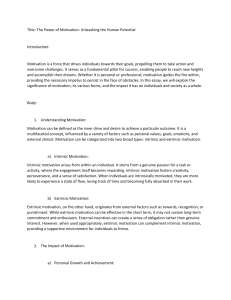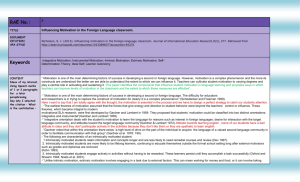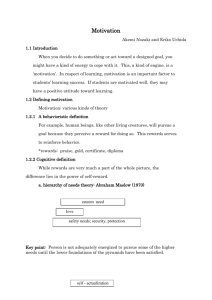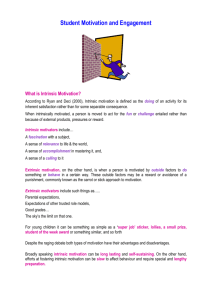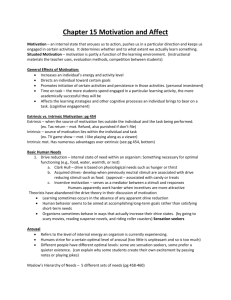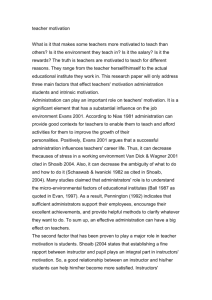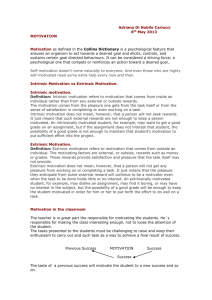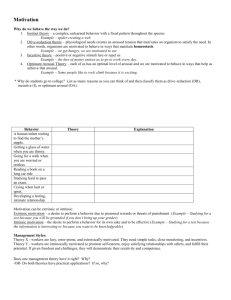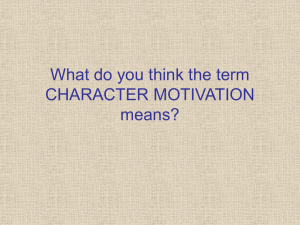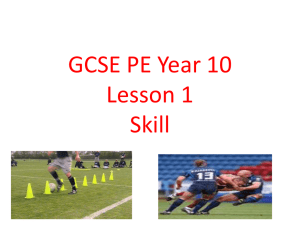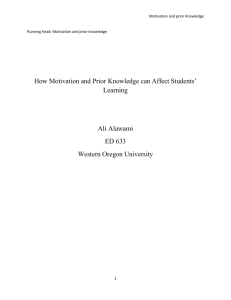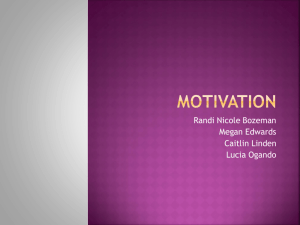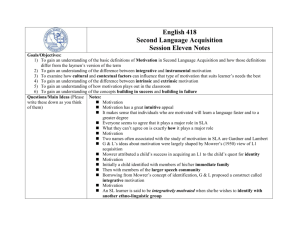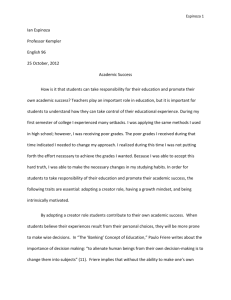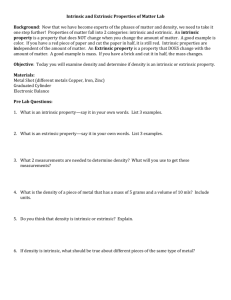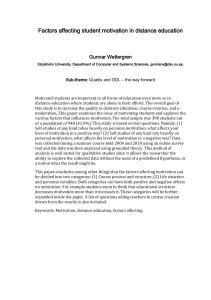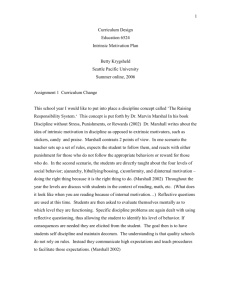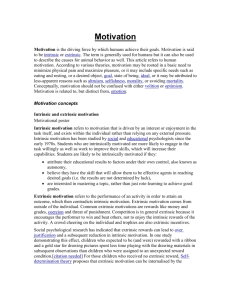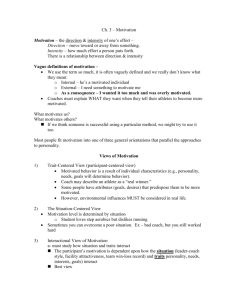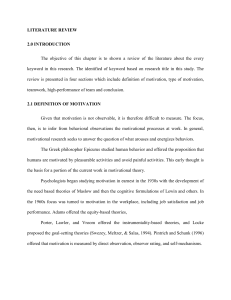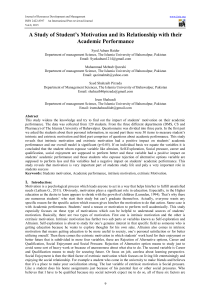Motivation and Learning What is motivation? An internal state that
advertisement
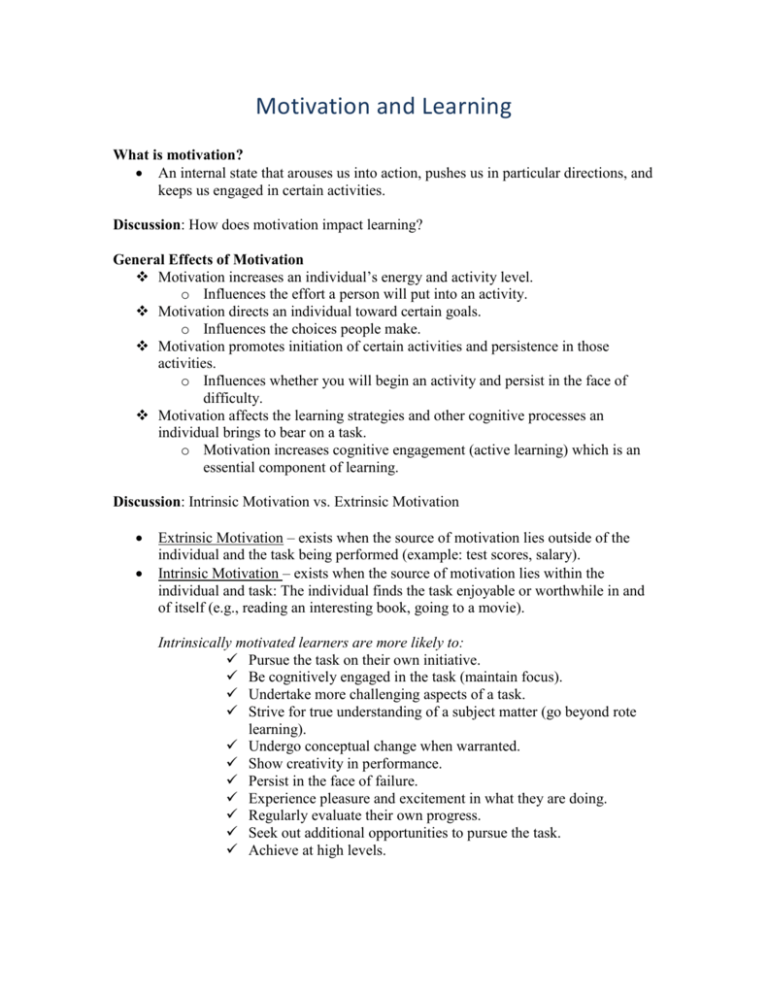
Motivation and Learning What is motivation? An internal state that arouses us into action, pushes us in particular directions, and keeps us engaged in certain activities. Discussion: How does motivation impact learning? General Effects of Motivation Motivation increases an individual’s energy and activity level. o Influences the effort a person will put into an activity. Motivation directs an individual toward certain goals. o Influences the choices people make. Motivation promotes initiation of certain activities and persistence in those activities. o Influences whether you will begin an activity and persist in the face of difficulty. Motivation affects the learning strategies and other cognitive processes an individual brings to bear on a task. o Motivation increases cognitive engagement (active learning) which is an essential component of learning. Discussion: Intrinsic Motivation vs. Extrinsic Motivation Extrinsic Motivation – exists when the source of motivation lies outside of the individual and the task being performed (example: test scores, salary). Intrinsic Motivation – exists when the source of motivation lies within the individual and task: The individual finds the task enjoyable or worthwhile in and of itself (e.g., reading an interesting book, going to a movie). Intrinsically motivated learners are more likely to: Pursue the task on their own initiative. Be cognitively engaged in the task (maintain focus). Undertake more challenging aspects of a task. Strive for true understanding of a subject matter (go beyond rote learning). Undergo conceptual change when warranted. Show creativity in performance. Persist in the face of failure. Experience pleasure and excitement in what they are doing. Regularly evaluate their own progress. Seek out additional opportunities to pursue the task. Achieve at high levels. Discussion: How can we increase intrinsic motivation with our students? Students learn more effectively and engage in more productive classroom behaviors when they are intrinsically, rather than extrinsically motivated to learn and achieve. Students are more likely to be intrinsically motivated when they feel confident they can succeed at classroom tasks. Students’ intrinsic motivation also increases when they have some degree of autonomy in classroom activities. Extrinsic motivation can also promote learning. Feedback and other forms of extrinsic reinforcement should maintain or enhance students’ sense of competence and self-determination Students are more likely to focus on their school when their nonacademic needs have been met. Classroom assessments are more effective motivators when students perceive them as a means of enhancing future achievement rather than as judgment of ability and worth. Teachers and peers are highly influential in changing student attitudes about learning and science (e.g., George, 2007) Self-determination – People want to feel competent and have some autonomy. Learners are more likely to be intrinsically motivated when they have a sense of self-determination about their present circumstances. General Principles to Guide Teacher Efforts in Student Motivation: o Students learn more when they find classroom material interesting as well as informative o Students tend to be more optimistic about their chances of success when they have environmental support for their efforts. o Students are more motivated to learn classroom subject matter when they believe it has value for them personally. o Students learn more effectively when they set goals for themselves. o In general, mastery goals lead to better learning than performance goals. o Classroom activities are more effective when they enable students to meet several goals at once. o Optimistic teacher attributions and expectations regarding students’ achievement boost students’ actual achievement. o Most of the time, and for most students, noncompetitive activities are more motivating than competitive ones. Competition promotes performance goals rather than mastery goals Competition promotes attributions to ability rather than to effort For the losers, competition promotes a low sense of competence and diminished self-worth. o Challenges heighten motivation and minimize boredom
